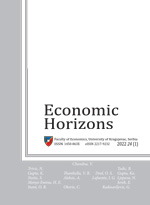SYSTEMIC LIMITATIONS OF THE COMPETITIVENESS OF SERBIA’S ECONOMY
Ljiljana Maksimovic
Faculty of Economics, University of Kragujevac, Kragujevac, Serbia
The paper analyzes the ways for measuring competitiveness as well as the Global Competitiveness Index which, pursuant to the methodology of the World Economic Forum, ranks countries’ competitiveness within global frameworks. The analysis begins with a hypothesis that the macroeconomic performances of national economies are positively correlated with their global competitiveness index, which has been shown on the examples of Serbia, Croatia, Slovenia and Slovakia. The other hypothesis is that the bad macroeconomic performances of the Serbian economy and its bad ranking according to the Global Competitiveness Index are the result of the systemic limitations in the Serbian economy. The analysis presented in the paper shows that systemic limitations such as the concept of transition (privatization) and its realization, the concept of macroeconomic stabilization, the concept of institutional reforms and the concept of restructuring economy are the main originators of the non-competitiveness of Serbia’s economy.
Keywords: competitiveness, The Global Competitiveness Index, systemic limitations
JEL Classification: E02, D02, F43, O11, O12
Economic Horizons, 2012, Vol. 14, No. 2, pp. 101-111. doi:10.5937/ekonhor1202099M
| Full Text |




